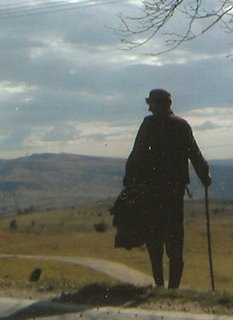Vlachs, Dacians, Geto-Dacians, Migratory Ethnic Groups
 Vlach shepherd, Romania
Vlach shepherd, Romania
. Vlach shepherd, Romania
Vlach shepherd, Romania
This
shepherd was alone in herding a large flock of sheep, as we all waited for them to scurry among the 18-wheelers and cars, through the village. Their dogs are
indispensable. See more on the Romanian shepherd dogs at http://www.romdogs.tripod.com/ogar/romshdog.
.
The
shepherd we watched leaped across the road, carrying his possessions
(no carts seen); and was gone. Stragglers among the sheep ran to catch
up, and did, but he did not call. No sheepdogs. Vlach origins, north
and south of the Danube: http://www.fact-index.com/h/hi/history_of_vlachs.html. Traders, shepherds, craftsmanship. Chronology there of dates and events.
.
Someone described that kind of sight as a cloud of sheep. Exactly. Find one such reference at Dominick Finello's Pastoral Themes and Forms in Cervantes' Fiction/.
 Vlach sheep, crossing road, Romania
Vlach sheep, crossing road, Romania.
The Vlachs are an ancient people that are in many eastern European countries. Tradition roots them in the Indus Valley, India migrations of an ethnic group commonly called "gypsies", or Roma (nothing to do with Rome, however), whether accurately or not, these peoples have kept their own ways.
See Gypsies, Roma, Romani.
.
Vlach may the root of "Wallachia" or "Vlachia". Some believe that it was the Vlachs who originally founded Romania, and were the indigenous people when the Romans came. See the Romania section at http://www.mysite.du.edu/~etuttle/misc/europe.htm#Mong
.
The Vlachs remain distinct. There were also, however Dacians in the area, another group also laying claim to the indigenous people-founding Romania status. http://www.rotravel.com/History/The-Geto-Dacians/ Their leader, Burebista, 82-44 BCE, opposed Caesar. The society was strong and well organized: they conquered some area Greek cities, and fended off the Celts. Also known as Geto-Dacians, they are referred to from the 6th Century BCE, with Herodotus the first to use the term "Getae" for the peoples north of the Danube. Danube? Germany?
.
The Danube stretches from its mouth at Moldavia-Romania (delta), back through borders with Bulgaria, then Serbia (old), Hungary, Slovakia, Austria, etc. See map at http://www.donau-info.org/donau.php?pg=0&lg=en. The mighty Danube became the border, back at the Romanian history site now, between the Geto-Dacians and the Romans. Finally, after fierce wars, the Romans, through Trajan, won. http://www.rotravel.com/History/The-Geto-Dacians/ Migrations ensued among tribes opposing Rome. Greek and Roman documents, says http://www.eliznik.org.uk/RomaniaHistory/dacia.htm, called these people Thracians. Other kings: Decebal and Dromihetes.
Geto-Dacians. This also puts the Getae in line, possibly, as the Geats, the tribe later found in northern Europe, the tribe of Beowulf. Beowulf, earliest poem, Saxon, see http://www.alcyone.com/max/lit/beowulf/.
Hwaet! That is the word commonly translated as "Lo!" or "Hark!" See first line of poem, Beowulf. Nuts. it is Hwaet!. See http://www.urbandictionary.com/define.php?term=hw%C3%A6t
See http://www.awesomestories.com/flicks/beowulf-grendel/who-were-the-geats. Much speculation as to the origin of the Geats. Did they migrate, with many others, north, right up the Danube? Across Carpathians, through Caucasus? Why not look here, scholars? Wikipedia starts its analysis of identity long after the migrations of north-of-Danube peoples unwilling to live under Caesar, see http://en.wikipedia.org/wiki/G%C3%B6tar. I started far earlier, see Sigge Fridulsson, Fridulfson, and the Swedish legends (legends themselves rooted in unknowable events?) at Sigge Fridulsson, Caucasus Migration North, Caesar Era
More Vlach history http//: www.friesian.com/decdenc2, and at http://www.eliznik.org.uk/RomaniaHistory/vlach-south/; and ://www.columbia.edu/cu/romanian/articles/aromani. And, of course, a book: http://www.amazon.com/Vlachs-History-Balkan-People/dp/0312009372
.
Road manners.
The fun part here was the good humor of the truckers stopped in their tracks in the village -- no anger, no fingers, just open the window, lean out and chat and smile in good humor as, when all seemed to be past, somebody went under the truck to coax out the last straggler. To an outsider, it looked like respect for someone else's assets and way of life. Room for many. What's the rush.
.
Less developed countries respect others' lives more. Is that so? I seldom saw any kind of road kill. That may not mean a particular love of animals -- stray dogs are everywhere -- recognizable breeds -- from the edicts in Bucharest that people whose neighborhoods were destroyed by Ceaucescu's urban renewal. Apparently, people could not move into the new apartment highrise boxes, with dogs. The absence of road kill could mean, rather than altruism: 1) skill in veering; and we agree; or 2) the practical side. A hit may damage your own vehicle.
.
We have found them in Greece and Croatia, for example, see more about "Aromanian Vlachs: The Vanishing Tribe," at http://www.vlachophiles.net/.
Wikimedia Commons provides this map of migrations, and the resolution is as you see it: see http://commons.wikimedia.org/wiki/File:Migration_des_Roms.jpg
.
There are supposed to be some Vlachs in Texas - see map and discussion of migrations at http://www.angelfire.com/tx5/texasczech/Valachs/Who%20are%20the%20Valachs.htm
.
Modern map of Eastern Europe, for identifying the foggy lettering above: Wikimedia Commons at http://commons.wikimedia.org/wiki/File:Eeurope_rel84.jpg
The mother of the Hungarian hero, Janos Hunyadi (governor of Transylvania in the 15th century, castle at Hundoara, Romania) was said to be Vlach. The Vanishing Tribe site says that Vlachs set up Wallachia.
.
Update - from our 2007 trip to Poland:
.
Some Vlachs migrated to Poland - see the Magurski National Park site at http://www.staff.amu.edu.pl/~zbzw/ph/pnp/magu.htm. There, the people were called "Lemks," and lived in the Low Beskid region, with only a few survivors now. There are vestiges of their culture, and later orthodox religion there, and in roadway shrines. The article says they were deported in 1947 for political reasons. See populations post at Poland Road Ways.
.
Vlachs - Once there is an awareness of something new, all sorts of other information comes out - now we find Vlach references in many places and contexts. More at a Vlach site, http://www.bastian.freeyellow.com/index.
No comments:
Post a Comment